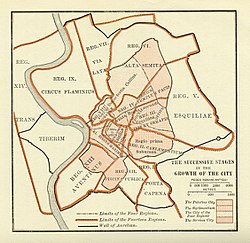
Back Romeinse monargie Afrikaans المملكة الرومانية Arabic المملكة الرومانية ARZ Monarquía romana AST Romafi Gazaroti AVK Roma çarlığı Azerbaijani Рымскае царства Byelorussian Regne Romà Catalan Římské království Czech Teyrnas Rhufain Welsh
Roman Kingdom | |||||||||||
|---|---|---|---|---|---|---|---|---|---|---|---|
| 753 BC–509 BC | |||||||||||
 The ancient quarters of Rome | |||||||||||
| Capital | Rome | ||||||||||
| Common languages | Latin | ||||||||||
| Religion | Roman religion | ||||||||||
| Government | Elective monarchy | ||||||||||
| King | |||||||||||
• 753–716 BC | Romulus | ||||||||||
• 715–673 BC | Numa Pompilius | ||||||||||
• 673–642 BC | Tullus Hostilius | ||||||||||
• 642–616 BC | Ancus Marcius | ||||||||||
• 616–579 BC | L. Tarquinius Priscus | ||||||||||
• 578–535 BC | Servius Tullius | ||||||||||
• 535–509 BC | L. Tarquinius Superbus | ||||||||||
| Legislature | |||||||||||
| Historical era | Iron Age | ||||||||||
| 753 BC | |||||||||||
| 509 BC | |||||||||||
| |||||||||||
| Today part of | |||||||||||
The Roman Kingdom (Latin: Regnum Romanum) was the monarchical government of the city of Rome and its territories. No written records from the time survive. The histories about it were written during the Roman Republic and the Roman Empire and are largely based on legend. Therefore, not much is certain about the history of the Roman Kingdom.
However, the history of the Roman Kingdom began with the founding of Rome, which is traditionally dated to 753 BC, and ended with the overthrow of the kings and the establishment of the Roman Republic in about 509 BC.
